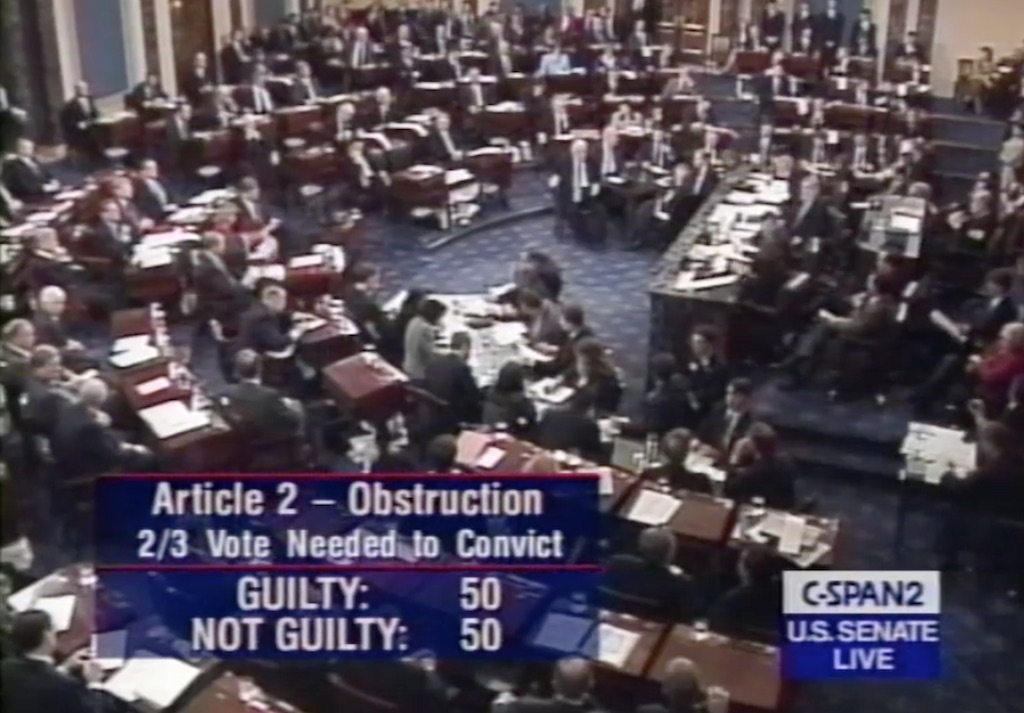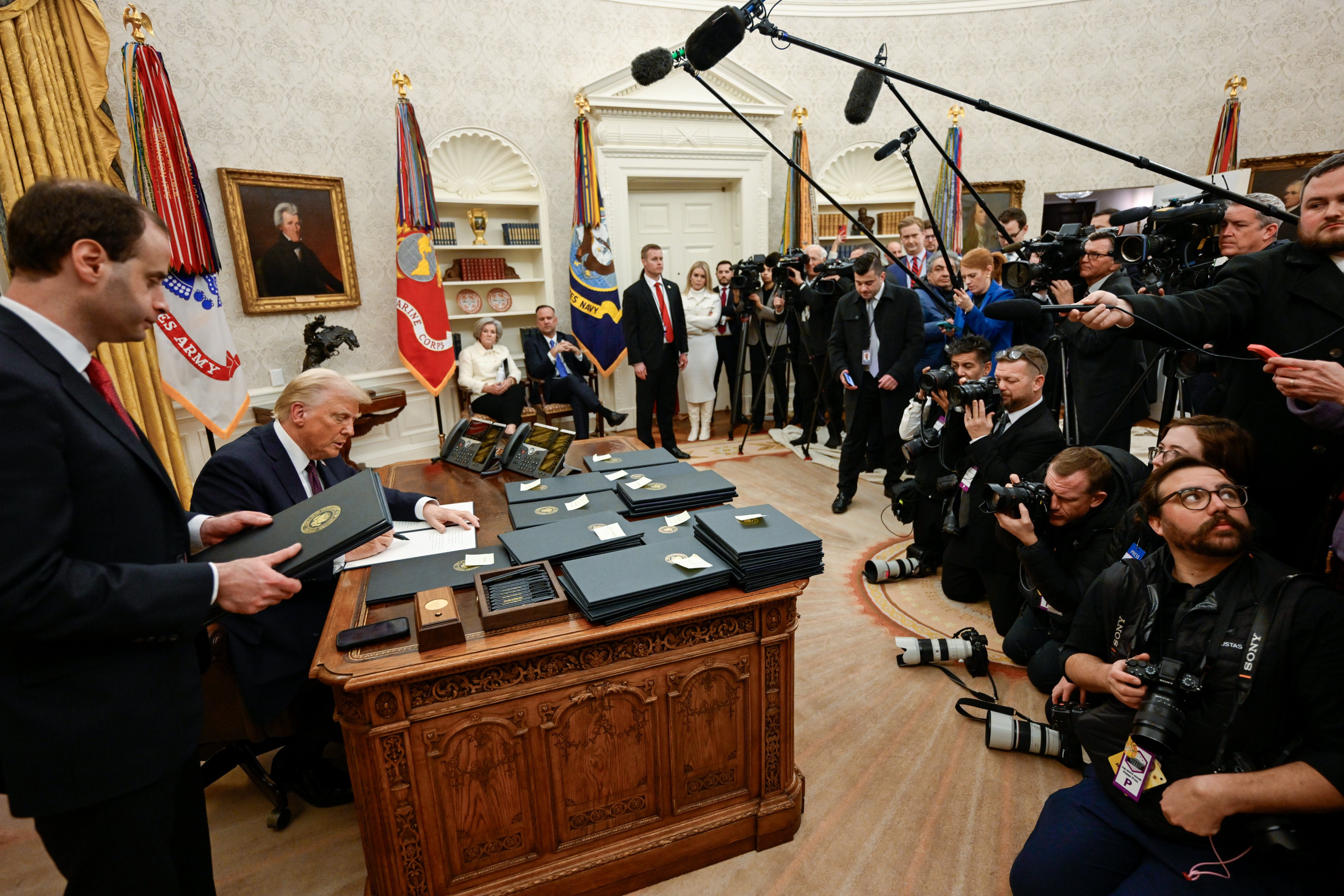Should Congress Treat Impeachable Offenses Cumulatively?
Are high crimes cumulative? This is not a question that either Congress or scholars have had much reason to consider, but President Trump’s failings have made it relevant. Moreover, the answer to that question might well matter for conscientious Republican senators faced with an impeachment trial. It is the accumulation of instances of significant misconduct that might justify the impeachment and removal of President Trump rather than a single identifiable act of abuse of power that by itself demands the immediate truncation of the president’s term of office.

Published by The Lawfare Institute
in Cooperation With

Are high crimes cumulative? This is not a question that either Congress or scholars have had much reason to consider, but President Trump’s failings have made it relevant. Moreover, the answer to that question might well matter for conscientious Republican senators faced with an impeachment trial. It is the accumulation of instances of significant misconduct that might justify the impeachment and removal of President Trump rather than a single identifiable act of abuse of power that by itself demands the immediate truncation of the president’s term of office.
The U.S. Constitution does not specify how the House and the Senate should deliberate on and resolve alleged high crimes and misdemeanors. The text simply says that the House shall have the sole power of impeachment, the Senate shall have the sole power to try all impeachments, and that no person shall be convicted except by the concurrence of two-thirds of the senators present. Like other business conducted in Congress, the Constitution leaves the details of the impeachment process up to the majority of each chamber to determine through its own rules and precedents.
The history of federal impeachment trials and the analogy with criminal trials would suggest that high crimes should be considered individually and not in their totality. The Senate has traditionally modelled its involvement in the impeachment process on the criminal justice system. The Constitution refers to the Senate’s role as one of conducting a trial. The senators take an oath to “do impartial justice according to the Constitution and laws.” The Senate has held itself out as the “high court of impeachment” and the “grand inquest of the nation.” When President Andrew Johnson was called to account for his actions before the Senate in an impeachment trial, the senators sparred a bit over how their proceedings should be characterized. Some thought such “high sounding words” were not in keeping with the plainspoken nature of a representative assembly in a modern republic. But the decisive response even in the highly partisan environment of the Johnson impeachment was that the Senate could sit in impeachments “in a judicial capacity, and no other.” The key point, as laid out by Vermont Republican George Edmunds, is that
there is to be a plain line that all men can see between the character in which we are now sitting doing legislative business and that character in which we shall be sitting when we are called upon to lay aside every prejudice and every partiality and every idea that can enter into the political and legislative mind and to put on the white robes of justice, to try impartially, as judges, a cause.
The Senate strives to provide impeached officials with the trappings of a fair trial. Rules of evidence are observed. Cross-examination of witnesses is allowed. A defense is presented by advocates chosen by the accused.
And in the end, the senators are called to vote. The Senate rules regarding the final vote on whether to sustain the House’s articles of impeachment were given their modern form when the Senate was preparing itself for the first presidential impeachment. Rule XXIII as it now stands states that “on the final question whether the impeachment is sustained, the yeas and nays shall be taken on each article of impeachment separately.” Furthermore, as “Hind’s Precedents” observes, the rule was adjusted “after the analogy of the criminal law” to make clear that a two-thirds vote on any individual article of impeachment would be sufficient to render a conviction. The House did not need to persuade the Senate to sustain all the articles of impeachment in order to remove an officer; it only needed to persuade the Senate that the officer was guilty of a single impeachable offense. But just as a jury is asked to evaluate whether each charge in a criminal indictment has been shown to be true beyond a reasonable doubt, so the Senate has proceeded as if the evidence and arguments mustered on behalf of one article of impeachment is of no consequence when considering another article of impeachment.
Notably, the House has not traditionally operated this way. The House has exercised its sole power of impeachment by authorizing a committee to investigate impeachment charges and to draft a report with any appropriate articles of impeachment. The members of the House have not generally been asked to vote separately on each article of impeachment. It has been deemed sufficient that they cast a single vote on whether an officer should be impeached, leaving the details regarding the specific offenses that might justify an impeachment in the hands of the committee. The Senate has insisted that its members vote on each charge separately, but the House has merely asked its members to make a more holistic judgement of whether impeachment is warranted.
Why might any of this matter? Historically, it has mattered because some impeachment charges have seemed like a stretch. The fact that the Senate has voted on the charges separately and regarded a successful vote on any single charge as sufficient has allowed the House to put forward weaker charges without undermining their entire case. In the case of Andrew Johnson, it was potentially significant that each charge be evaluated on its own merit because many observers were skeptical of Radical Republican Thaddeus Stevens’s controversial Article X, which charged the president with acting in a manner “unmindful of the high duties of his office” by giving public speeches that “in substance” questioned the legitimacy of the 39th Congress and tended to subject the legislature to “disgrace, ridicule, hatred, contempt and reproach.” As it turned out, the senators cast the same number of votes for conviction under catch-all Article XI (which referenced Article X) as they did for the more conventional Article II, which charged Johnson with willfully violating the Tenure of Office Act by attempting to remove and replace the secretary of war.
In other cases, however, two thirds of the senators have been willing to vote to convict on some articles of impeachment but not on others. Just a few years earlier, the Senate had voted to convict, remove and permanently disqualify from office Judge West Humphreys, who had abandoned his judicial duties for the United States in order to serve as a trial court judge for the Confederate States of America. Unsurprisingly, Humphreys failed to appear before the Senate and present a defense in the midst of the Civil War, and he was unanimously convicted of the very first charge of giving a public speech to incite revolt and rebellion. At that point, the Senate paused to consider whether it could simply vote on the remaining articles of impeachment as a package. The upper chamber decided not to do so because some senators doubted that every article had been “sufficiently proved.” Instead, each senator was asked in turn whether Humphreys was guilty of the specific charges contained in each article of impeachment, and on one article the judge was not found guilty —the charge that acting as a Confederate judge he had ordered the confiscation of Senator Andrew Johnson’s property in Tennessee. Voting separately on the articles of impeachment allowed senators to vote their conscience and fulfill their oath by declining to convict when the evidence of guilt was thin or the constitutional adequacy of the offense was uncertain.
President Trump presents a different problem, and indeed a problem that would be unique in the history of federal impeachments. The concerns revolving around President Trump do not center on a single incident like President Johnson’s effort to remove Secretary of War Edwin Stanton, or even a closely related set of incidents like Judge Humphreys’ support of the secessionist cause. President Trump has found himself entangled in a myriad of legal, political and constitutional difficulties, and he seems to stumble into more with every news cycle. If the House were to pursue impeachment charges against the president—perhaps after the midterm election and the seating of a new Democratic majority – the biggest challenge might be how to edit the list of potential impeachment charges down to a manageable size. Members of the House Democratic caucus have already introduced possible articles of impeachment focused on the president’s rhetoric after the Charlottesville riot and his unerring ability to bring the presidency into “contempt, ridicule, disgrace and disrepute.” It is easy to imagine more, ranging from his actions during the 2016 election campaign to his obstruction of the Russia investigation to his ongoing financial conflicts of interest to his handling of national security secrets to his abuse of his discretionary constitutional and statutory authority. Rather than doing everything possible to walk back out of impeachment territory and demonstrate that impeachment is not a necessary remedy to what ails the White House, the president and his supporters have preferred to dig in and try to weather the storm.
Trump’s critics have an embarrassment of riches when it comes to presidential scandals. Their difficulty comes with establishing that any single scandal is sufficient to justify the president’s impeachment and removal. Of course the president’s most committed foes are already convinced that Trump should be removed from office. Indeed, many thought extraordinary steps should have been taken to prevent him from even being inaugurated. The president’s fellow partisans, however, have thus far been unimpressed. Although many Republicans might readily admit President Trump’s many missteps, relatively few are prepared to say that those missteps amount to impeachable offenses that would justify overturning the will of the voters. Like Bill Clinton before him, Donald Trump benefits from the fact that those who cast their ballots in his favor had already decided that his personal flaws did not override his political utility. Trump’s many foibles were priced in to his presidency.
If the president is impeached and his case is tried in the Senate, his fate will depend on the decision of a number of Republican senators. The Democrats might possess the simple majority needed to impeach in the House, but they will not possess the supermajority needed to convict in the Senate. Whether the president is convicted and removed will depend on whether the president’s critics are able to offer arguments that are persuasive to at least a sizable portion of Republicans. For Republican senators, the decision of whether to convict and remove the president will depend not only on an assessment of the facts and the law but also on a political judgment of whether removal would be in the best interest of the country and of the Republican Party. What might sway them?
It might well matter whether the Democrats are able to get beyond individual charges and convince senators to think about the case for impeachment more holistically. The senators will almost certainly follow precedent and vote on each article of impeachment separately. To the skeptical Republican, each individual article of impeachment might well look to be serious but insufficient to justify conviction and removal. Although one should never say never with this president, it does not currently appear likely that there is going to be a single silver bullet, a single high crime that, if adequately demonstrated, would command bipartisan agreement on its importance. Instead, Democrats are likely to find themselves in possession of a host of offenses, each reasonably supported by evidence (often enough the evidence of the president’s own public statements), each damning in its own way, and yet each arguably falling short of justifying removal. Did the president give rhetorical comfort to white supremacists? No doubt. Did the president throw up obstacles to a full investigation of Russian meddling with the 2016 president elections? Certainly. Did the president use his power to pardon in revolting ways? Apparently. Did the president maintain financial interests at odds with responsibilities of his office? Possibly. Did the president contribute to the criminal violation of campaign finance laws? Maybe. Did the president collaborate with foreign powers to advance his own electoral prospects? Perhaps.
If Republican senators were forced to examine each such charge in turn, they might well find the president’s actions disquieting and misguided and yet not impeachable. The accumulation of such charges might, however, push the case for impeachment and removal over the line. A constitutionally conscientious senator must be able to see the forest as well as the trees. Such a senator might well think that if a president had brought his office into disrepute with contemptible rhetoric or if a president had egregiously abused his pardoning power, that the president should nonetheless be tolerated until the people had the opportunity to remove him at the next election. If asked to vote on an article of impeachment charging a president with such misdeeds, a senator might well believe that, all things considered, the president should not be convicted and removed. If asked to vote on multiple articles of impeachment detailing a long train of abuses, however, even sympathetic senators could appropriately decide that such evils are not politically or constitutionally endurable. It is the history of repeated injuries and usurpations that could suggest that patient sufferance is no longer the appropriate course of action.
An impeachment trial is inescapably political, which is why the power to impeach is entrusted into the hands of the members of Congress. Senators must render a judgment not only on what has in fact happened but also on what the constitutional significance of what has happened might be. In reaching that judgment, senators must not only assess the acts but must also assess the man who has committed the acts. If there are means short of impeachment and removal available to stem the damage to the public wellbeing that a federal officer is inflicting, then the members of Congress have an obligation to take the steps necessary to safeguard the nation from that damage.
If, however, offenses pile upon offenses and an officer cannot be adequately checked and trusted to conduct himself in a more responsible manner befitting his high office, then the constitutional calculus changes. Impeachable offenses cannot be adequately evaluated is isolation. Although senators might be called upon to vote on one charge at a time, they have a responsibility to consider the totality of circumstances when casting that vote.





